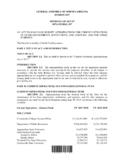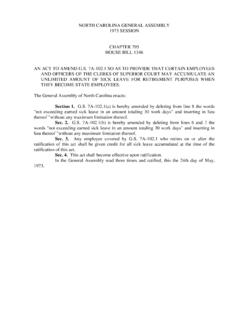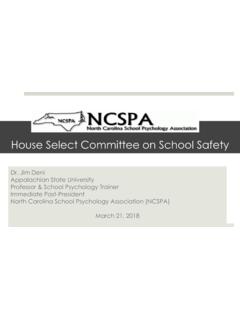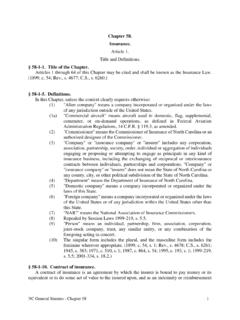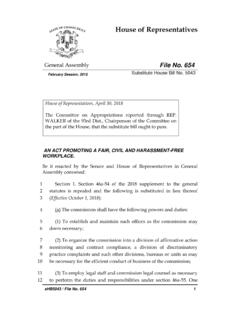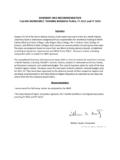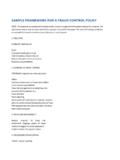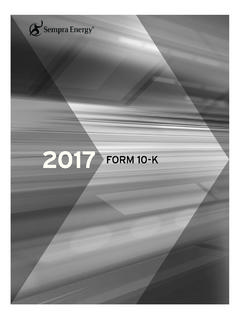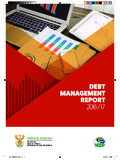Transcription of GENERAL ASSEMBLY OF NORTH CAROLINA …
1 GENERAL ASSEMBLY OF NORTH CAROLINA SESSION 2013 SESSION LAW 2013-413 HOUSE bill 74 *H74-v-3* AN ACT TO IMPROVE AND STREAMLINE THE REGULATORY PROCESS IN ORDER TO STIMULATE JOB CREATION, TO ELIMINATE UNNECESSARY REGULATION, TO MAKE VARIOUS OTHER STATUTORY CHANGES, AND TO AMEND CERTAIN ENVIRONMENTAL AND NATURAL RESOURCES LAWS. The GENERAL ASSEMBLY of NORTH CAROLINA enacts: PART I. IMPROVE RULE-MAKING PROCESS SECTION 1. 150B-2 is amended by adding a new subdivision to read: "(7a) "Policy" means any nonbinding interpretive statement within the delegated authority of an agency that merely defines, interprets, or explains the meaning of a statute or rule. The term includes any document issued by an agency which is intended and used purely to assist a person to comply with the law, such as a guidance document." SECTION 2. reads as rewritten: " Fiscal notes on rules. (a) State Funds. Before an agency publishes in the NORTH CAROLINA Register the proposed text of adopts a permanent rule change that would require the expenditure or distribution of funds subject to the State Budget Act, Chapter 143C of the GENERAL Statutes it must submit the text of the proposed rule change, an analysis of the proposed rule change, and a fiscal note on the proposed rule change to the Office of State Budget and Management and obtain certification from the Office of State Budget and Management that the funds that would be required by the proposed rule change are available.
2 The agency shall submit the text of the proposed rule change, an analysis of the proposed rule change, and a fiscal note on the proposed rule change to the Office at the same time as the agency submits the notice of text for publication pursuant to The fiscal note must state the amount of funds that would be expended or distributed as a result of the proposed rule change and explain how the amount was computed. The Office of State Budget and Management must certify a proposed rule change if funds are available to cover the expenditure or distribution required by the proposed rule change. (a1) DOT Analyses. In addition to the requirements of subsection (a) of this section, any agency that adopts a rule affecting environmental permitting of Department of Transportation projects shall conduct an analysis to determine if the rule will result in an increased cost to the Department of Transportation.
3 The analysis shall be conducted and submitted to the Board of Transportation before when the agency publishes the proposed text of the rule change in the NORTH CAROLINA the notice of text for publication. The agency shall consider any recommendations offered by the Board of Transportation prior to adopting the rule. Once a rule subject to this subsection is adopted, the Board of Transportation may submit any objection to the rule it may have to the Rules Review Commission. If the Rules Review Commission receives an objection to a rule from the Board of Transportation no later than 5:00 of the day following the day the Commission approves the rule, then the rule shall only become effective as provided in (b1). (b) Local Funds. Before an agency publishes in the NORTH CAROLINA Register the proposed text ofadopts a permanent rule change that would affect the expenditures or revenues of a unit of local government, it must submit the text of the proposed rule change and a fiscal note on the proposed rule change to the Office of State Budget and Management as provided by , the Fiscal Research Division of the GENERAL ASSEMBLY , the NORTH CAROLINA Page 2 Session Law 2013-413 House bill 74-Ratified Association of County Commissioners, and the NORTH CAROLINA League of Municipalities.
4 The fiscal note must state the amount by which the proposed rule change would increase or decrease expenditures or revenues of a unit of local government and must explain how the amount was computed. (b1) Substantial Economic Impact. Before an agency publishes in the NORTH CAROLINA Register the proposed text ofadopts a permanent rule change that would have a substantial economic impact and that is not identical to a federal regulation that the agency is required to adopt, the agency shall prepare a fiscal note for the proposed rule change and have the note approved by the Office of State Budget and Management. The agency may request the Office of State Budget and Management to prepare the fiscal note only after, working with the Office, it has exhausted all resources, internal and external, to otherwise prepare the required fiscal note. If an agency requests the Office of State Budget and Management to prepare a fiscal note for a proposed rule change, that Office must prepare the note within 90 days after receiving a written request for the note.
5 If the Office of State Budget and Management fails to prepare a fiscal note within this time period, the agency proposing the rule change shall prepare a fiscal note. A fiscal note prepared in this circumstance does not require approval of the Office of State Budget and Management. If an agency prepares the required fiscal note, the agency must submit the note to the Office of State Budget and Management for review. The Office of State Budget and Management shall review the fiscal note within 14 days after it is submitted and either approve the note or inform the agency in writing of the reasons why it does not approve the fiscal note. After addressing these reasons, the agency may submit the revised fiscal note to that Office for its review. If an agency is not sure whether a proposed rule change would have a substantial economic impact, the agency shall ask the Office of State Budget and Management to determine whether the proposed rule change has a substantial economic impact.
6 Failure to prepare or obtain approval of the fiscal note as required by this subsection shall be a basis for objection to the rule under (a)(4). As used in this subsection, the term "substantial economic impact" means an aggregate financial impact on all persons affected of at least five hundred thousand dollars ($500,000) one million dollars ($1,000,000) in a 12-month period. In analyzing substantial economic impact, an agency shall do the following: (1) Determine and identify the appropriate time frame of the analysis. (2) Assess the baseline conditions against which the proposed rule is to be measured. (3) Describe the persons who would be subject to the proposed rule and the type of expenditures these persons would be required to make. (4) Estimate any additional costs that would be created by implementation of the proposed rule by measuring the incremental difference between the baseline and the future condition expected after implementation of the rule.
7 The analysis should include direct costs as well as opportunity costs. Cost estimates must be monetized to the greatest extent possible. Where costs are not monetized, they must be listed and described. (5) For costs that occur in the future, the agency shall determine the net present value of the costs by using a discount factor of seven percent (7%). (b2) Content. A fiscal note required by subsection (b1) of this section must contain the following: (1) A description of the persons who would be affected by the proposed rule change. (2) A description of the types of expenditures that persons affected by the proposed rule change would have to make to comply with the rule and an estimate of these expenditures. (3) A description of the purpose and benefits of the proposed rule change. (4) An explanation of how the estimate of expenditures was computed. (5) A description of at least two alternatives to the proposed rule that were considered by the agency and the reason the alternatives were rejected.
8 The alternatives may have been identified by the agency or by members of the public. (c) Errors. An erroneous fiscal note prepared in good faith does not affect the validity of a rule." House bill 74-Ratified Session Law 2013-413 Page 3 SECTION 3.(a) (c) reads as rewritten: "(c) Notice of Text. A notice of the proposed text of a rule must include all of the following: (1) The text of the proposed , unless the rule is a readoption without substantive changes to the existing rule proposed in accordance with (2) A short explanation of the reason for the proposed rule and a link to the agency's Web site containing the information required by (c). (3) A citation to the law that gives the agency the authority to adopt the rule. (4) The proposed effective date of the rule. (5) The date, time, and place of any public hearing scheduled on the rule. (6) Instructions on how a person may demand a public hearing on a proposed rule if the notice does not schedule a public hearing on the proposed rule and subsection (e) of this section requires the agency to hold a public hearing on the proposed rule when requested to do so.
9 (7) The period of time during which and the person to whom written comments may be submitted on the proposed rule. (8) If a fiscal note has been prepared for the rule, a statement that a copy of the fiscal note can be obtained from the agency. (9) The procedure by which a person can object to a proposed rule and the requirements for subjecting a proposed rule to the legislative review process." SECTION 3.(b) Part 2 of Article 2A of Chapter 150B of the GENERAL Statutes is amended by adding a new section to read: " Periodic review and expiration of existing rules. (a) Definitions. For purposes of this section, the following definitions apply: (1) Commission. Means the Rules Review Commission. (2) Committee. Means the Joint Legislative Administrative Procedure Oversight Committee. (3) Necessary with substantive public interest. Means any rule for which the agency has received public comments within the past two years.
10 A rule is also "necessary with substantive public interest" if the rule affects the property interest of the regulated public and the agency knows or suspects that any person may object to the rule. (4) Necessary without substantive public interest. Means a rule for which the agency has not received a public comment concerning the rule within the past two years. A "necessary without substantive public interest" rule includes a rule that merely identifies information that is readily available to the public, such as an address or a telephone number. (5) Public comment. Means written comments objecting to the rule, in whole or in part, received by an agency from any member of the public, including an association or other organization representing the regulated community or other members of the public. (6) Unnecessary rule. Means a rule that the agency determines to be obsolete, redundant, or otherwise not needed. (b) Automatic Expiration.

